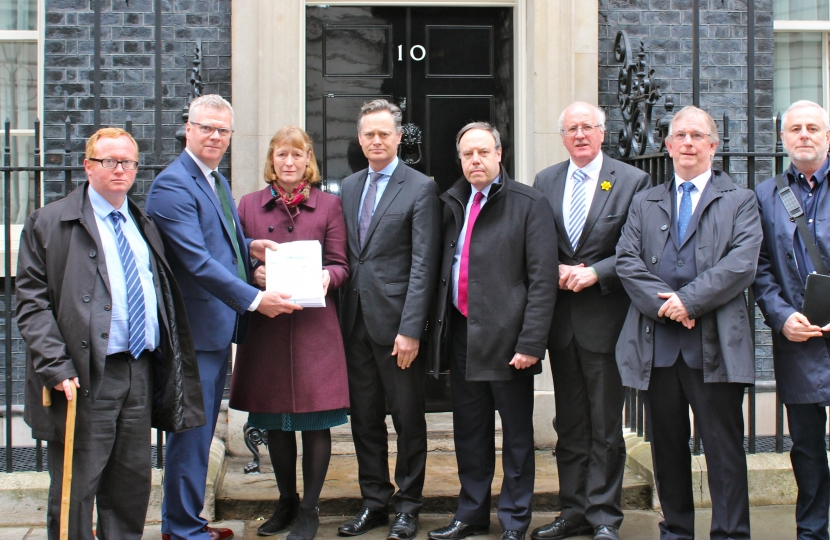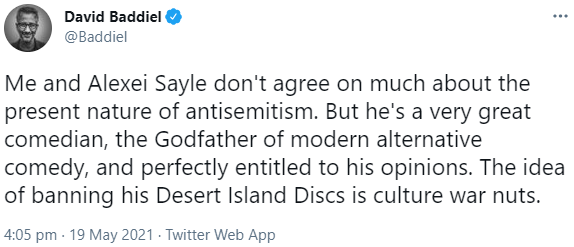Alexei Sayle, antisemitism and free speech
 A campaign was launched last week demanding that the BBC cancel the forthcoming episode of Desert Island Discs featuring pro-Palestinian comedian Alexei Sayle. At the time of writing the BBC is still standing firm against this ludicrous attempt at censorship and the programme will apparently go ahead as scheduled on Sunday. I’m not a regular listener to Desert Island Discs, but I’ll definitely be tuning in tomorrow morning in solidarity with Alexei.
A campaign was launched last week demanding that the BBC cancel the forthcoming episode of Desert Island Discs featuring pro-Palestinian comedian Alexei Sayle. At the time of writing the BBC is still standing firm against this ludicrous attempt at censorship and the programme will apparently go ahead as scheduled on Sunday. I’m not a regular listener to Desert Island Discs, but I’ll definitely be tuning in tomorrow morning in solidarity with Alexei.
Leading the charge has been Tory MP Matthew Offord, who wrote to the BBC director-general urging him to “stop the broadcast of Desert Island Discs featuring Alexei Sayle”. Unlike Alexei, who is himself Jewish, Offord is a practising Christian, apparently of the rightwing evangelical persuasion. (Over the years he has expressed enthusiastic support for Jesus House, the “gay conversion” church that Keir Starmer was recently obliged to apologise for visiting.) In keeping with a particular strand in evangelical Christianity, Offord is fervently committed to Zionism, being an officer of Conservative Friends of Israel and an honorary patron of the hard-right Zionist outfit that calls itself Campaign Against Antisemitism.
Offord is also an advocate of suppressing free speech in support of what he perceives to be Israeli interests. Here he is in 2018 with a group of fellow Zionist fanatics presenting a petition calling on Theresa May to take measures to ban the annual BDS-supporting Israeli Apartheid Week from university campuses. So the attack on Alexei Sayle was very much in line with Offord’s general contempt for the democratic rights of pro-Palestinian activists.

Offord levelled two charges against Alexei. First, that in 2017 he had “claimed that all allegations of antisemitism ‘amongst supporters of Jeremy Corbyn are a complete fabrication’.” And second, that in 2014 he had claimed that the then Telegraph journalist Emma Barnett was “abusing antisemitism to discredit Palestinians before denouncing her as ‘supporting the murder of children, the murder of women…from a fascist, Zionist ideology’.” Is there any substance to these charges?
Alexei did in fact make the comment about the fabrication of Labour antisemitism, in the course of an interview with Sky News. His exact words were: “I think the accusations of antisemitism within the Labour Party are all fabricated attacks on Jeremy Corbyn … I think that the notion of antisemitism within supporters of Jeremy Corbyn is a complete fabrication.”
This was not a sensible thing to say, frankly, and provided ammunition for Zionist hardliners who claim that even those leftwingers who are not open antisemites are in denial about antisemitism and therefore objectively antisemitic. Obviously some of the accusations against Corbyn supporters were accurate. There were after all around half-a-million Labour Party members at that time and it would have been astonishing if not a single one of them had expressed antisemitic views. Alexei should instead have said that the number of antisemites in the Labour Party was thankfully low and the problem had been grossly exaggerated in order to smear Corbyn and the left.
What is at issue here, however, is the bogus argument that a failure to recognise that a tiny proportion of Corbyn supporters were indeed guilty of antisemitism provides grounds for banning Alexei Sayle from the airwaves. Even David Baddiel, who has himself played an active part in whipping up hysteria over leftwing antisemitism, tweeted that Alexei was “perfectly entitled to his opinions” and that “the idea of banning his Desert Island Discs is culture war nuts”.

As for Alexei’s clash with Emma Barnett, this took place on Jeremy Vine’s radio show in July 2014 at the height of Israel’s war on Gaza, in the course of which an estimated 2,104 Palestinians died under Israeli bombardment, of whom 1,462 were civilians, including 495 children and 253 women.
Rather than criticise this slaughter, Barnett had written an article for the Telegraph titled “As a British Jew, I am now scared to talk about Israel and Gaza”. She claimed that “protesters marching in anti-Israel demonstrations have regularly held up anti-Semitic slogans, shouting for Jews to be gassed”, and that Jewish defenders of Israel were no longer able to speak freely for fear of provoking a backlash from these Palestine-supporting antisemites. With her inflammatory comments about “Muslims chanting ‘death to Jews’ on the streets of France, and attacking synagogues and setting fire to Jewish-owned stores”, the picture Barnett drew in this article was of a Europe on the verge of another Kristallnacht, carried out by Palestinian sympathisers.
In response Alexei Sayle agreed that “there are antisemitic cretins out there”, adding “I condemn them absolutely, unreservedly”, but argued that Barnett was trying to discredit opponents of Israel by falsely associating them with antisemitism. Pouring scorn on her self-dramatising claim that she had been intimidated into silence by antisemitic advocates of the Palestinian cause — “She’s so frightened to speak in favour of Israel that she’s appearing on Radio 2 and writing an article in the Telegraph” — he said her behaviour was clearly that of pro-Israeli propagandist. “She’s supporting the murder of women, the murder of children, that’s what she’s supporting”, Alexei stated. “From a fascist, Zionist ideology.” Barnett went apoplectic and threatened to sue him for defamation (which of course she never did) before Jeremy Vine intervened to close down the discussion.
Let us allow that Alexei’s use of the term “fascist” was ill-considered. When it came to Barnett’s views on the killing of women and children in Gaza, though, it was notable that she didn’t avail herself of the obvious defence that she did in fact condemn Israeli war crimes. That was hardly surprising. In her Telegraph article she had sneered at Reform rabbi Laura Janner-Klausner “wringing her hands” over the sufferings of the people of Gaza. Two weeks earlier Barnett had recommended an article by a pro-Netanyahu Times of Israel blogger, written on the eve of the assault on Gaza, which opened with this contemptuous dismissal of the bleeding hearts who would inevitably raise objections to the resulting carnage:
“If and when Israel embarks on a major offensive against Hamas in the Gaza Strip, a lot of people — watching from a safe distance — are going to be very cross. Human Rights Watch will be up in arms; Amnesty will be outraged. The BBC, CNN and Al Jazeera will show harrowing pictures (real and fabricated) of Israel’s ‘disproportionate’ action. My Facebook feed will be full of friends expressing horror at Israeli air strikes in Gaza, and #GazaUnderAttack will be trending on Twitter. All this, to the tune of another, repetitive chorus of Restraint from the diplomatic choirs of foreign governments.”
According Matthew Offord, Barnett was quite entitled to promote her offensive rejection of legitimate concerns about the atrocities committed by Israel against the people of Gaza, but Alexei Sayle ought to be banned by the BBC because he called her out over it. The BBC should be given credit for not capitulating to Offord’s politically motivated campaign to crush free speech.
Like the earlier attempt to get Ken Loach banned from a talk about his film making at an Oxford college, this is another welcome example of militant Zionists overreaching themselves and suffering a humiliating failure. When you have the likes of John Mann, and in Alexei’s case Ruth Smeeth, opposing attempts to suppress free speech for an opponent of Israel, the witch-hunters end up looking very foolish indeed.
The defeat of such attempts at censorship is not only a victory for the intended victims. It also undermines the ongoing campaign to impose a monolithic conception of antisemitism on society that blurs the distinction between anti-Jewish racism and hostility to Israel. When proponents of that campaign fall out among themselves over what constitutes antisemitism, it hopefully brings us closer to a situation where the issue can be discussed rationally, without critics of the prevailing Zionist consensus being howled down with hysterical accusations of Jew-hatred.
First published on Medium in May 2021